Are you looking for the best mentoring platform for your needs? You’re not alone.
John F. Kennedy was the 35th U.S. President. Oprah Winfrey is the greatest talk show star. Robert Kiyosaki, real estate tycoon. Bill Gates is Microsoft’s founder. Arnold Schwarzenegger is the father of Bodybuilding, 38th governor of California, A-list Actor, and businessman.
Five names. All industry leaders who helped change the world. What did they have in common? They attributed part of their greatness to mentors that fostered their passions and guided them down the right path. Those are just five names. Multiply that by 1000, and the top 5,000 icons will likely credit part of their success to their mentors.
Humans are a very interdependent species. Like many other processes in the past few years, organizational mentoring has also gone online. What does an online mentoring program look like? What should you expect from successful mentoring programs?
Online mentorship programs are something relatively new. So naturally, you’re looking for a map to navigate the foreign sea of a mentoring software. This article will go through what online mentoring platforms are, what they do, the criteria for the best platforms, and recommend the seven best mentoring programs you can join right now.
What Are Mentoring Platforms and Why Are They Important?
Online mentoring programs connect employees, entrepreneurs, and other industry newbies looking for guidance with seasoned experts who’ve been there and done that.
With traditional, real-life mentorships, you were lucky to find an industry professional willing to give you their time and advice long-term. It was hard to find someone who’d invest in you. Now, online mentoring software has bridged that gap. With a sophisticated mentor matching algorithm, thousands of mentees can find the right, willing mentors for their growth needs.
What the Data Says for Mentoring Programs
For the Mentee
- Increase Your Chances for Professional Growth: Those who are a part of mentorship programs are promoted five times more often than people who don’t have a mentor. As a result, you’re less prone to making mistakes. You earn the trust of higher-ups, and, at an amateur level, you’re armed with the wisdom of a seasoned expert–so you excel faster.
- You’re More Likely to Achieve Set Goals: You’re 40% more likely to achieve your goals if you write them down–that number increases to 70% if those goals are shared with a mentor that keeps you accountable.
- Build a Long-Standing Business With Less Chance of Failure: 70% of small businesses that receive mentoring survive five years or more, double the rate of non-mentored entrepreneurs.
For the Mentor
Most people believe mentorship is only beneficial for the mentees and organizations. However, it also holds many benefits for the mentors. Below are some of the benefits of becoming a mentor.
- Mentoring is an Excellent Opportunity to Reflect on Your Career Path: Mentoring allows you to consider how you got to your present position. You also genuinely reflect on the strengths that make you an effective mentor and if there are ways to grow further. One top mentor skill is leading by example. Therefore, when working with your mentee on various developmental goals, you can also map some out for yourself.
- It’s an Opportunity to Learn: One of the best ways to learn a skill is by teaching people how to do it. So while your mentees are developing their skills, you also have the opportunity to learn from them. For example, if you’re teaching your mentee how to fine-tune their feedback skills, you can have them give you feedback on your mentoring skills and learn from their comments to become a better mentor.
- Feel More Confident, Increase Competence, and Lead Better: 87% of mentors (and mentees) feel empowered by their mentoring relationships and have developed more confidence in their professional abilities.
- Demands Peak Performance and Limits Procrastination: As a mentor, setting an excellent example for your mentee is the best way to show them how to perform their duties. Coaching others can keep you more mindful of wasting time or slacking about to avoid costly procrastination.
For the Organization
Companies are continually looking for effective employee retention and engagement strategies. Most of them turn to mentors to connect employees with active learning engagements. 71% of US Fortune 500 companies use mentoring programs. Therefore, it is a go-to strategy for the most successful companies. Below are ways that companies benefit from mentoring.
- Mentoring Reduces Turnover Drastically: Turnover costs US businesses almost $1 trillion yearly. The cost of replacing employees is relatively high and can be as high as twice the employee’s salary. For the oil & gas industry, the replacement cost for specialized workers can be as high as 400% of the worker’s salary. Organizations using mentoring enjoy a higher retention rate than those that don’t
- Mentoring Results in Significant Cost Savings: Once an organization can reduce its turnover by introducing mentoring programs, there are significant savings in turnover costs. This results in more money available to spend in other business areas like hiring more staff, more benefits for existing staff, growing the business, and more. 67% of businesses report increased productivity thanks to enterprise mentoring. Additionally, 55% of companies claim that mentoring positively impacted their profits.
- Mentoring Provides Employees With Personal Engagement: Employees want to engage better within their organization and seek more than higher pay. In 2021, 65% of employees were looking for a new job. The job they want isn’t with a higher salary but with meaning, more significant work communities, and more excellent connections. These employees don’t mind leaving companies that don’t provide them with these opportunities. 94% of employees say they’d work at a company longer if they were offered opportunities to learn and grow. Yet, every 4 in 10 mentorless workers consider quitting their job within three months.
When workers are happy where they are, they tend to stick around, and this saves companies millions of dollars each year. This results in better work culture and reduces the negative effect of losing skilled workers in the organization.
Four Factors to Consider in Mentoring Platforms
You’re probably curious about what factors go into successful mentoring platforms. After all, you can’t decide which one is the best without knowing what makes the mentoring program great. So here are four things to consider (that we considered) when searching for the best mentoring software.
Comprehensive Participant Profiles
Profiling sometimes gets a bad rep because of how “boring” it is. But a thorough profile is a robust digital identity–which helps with mentor matching. When signing up on a mentoring platform, it’s essential to add demographic information like job title, department, location, contact information, work history, passions, and goals.
Integrated systems of records that facilitate the profiling process with some pre-filled information are a convenient plus.
Strong Mentor Matching System
Mentor-mentee matching isn’t guesswork. A value-packed mentoring platform will have an effective matching system that reads user-profiles and suggests recommendations.
A well-organized mentoring platform doesn’t have just one matching system in place, either. Instead, it’s versatile–ready for different user preferences. So, that means including self-directed (mentee surfs for mentor), administrative (the organization assigns mentee a fitting mentor), and automated matching (matching algorithm based on filters and criteria) systems.
Collaborative Tools to Foster Relationships
Matching an eager mentee with the right mentor is half the journey. Successful mentoring platforms should encourage and support communications post-match, too. That’s why collaborative tools are essential in mentoring software platforms to help with that.
You want to make sure the mentoring system allows mentees and mentors to post messages, ask/answer questions, share links and documents, schedule events, and even assign learning activities for maximum engagement and development.
It’s a plus if everything is recorded with an easily accessible history tab so users can revisit old lessons and conversations to refresh their memory and store notes.
Constant Growth Monitoring and Reports
Mentoring is all about growth. Online platforms are unique because, unlike real-life mentoring relationships, accountability is easier to record with referrable displays and graphs.
Program coordinators, mentors, and mentees can leverage integrated tools with monitoring capabilities for performance management, double down on smart mentoring activities that work, develop inclusion strategies for more mentor participation, and drive overall program success with the power of data.
However, steer away from any mentoring platform that promises a system that will run by itself. The achievable efficiency and productivity gains are possible through active engagement and effort; the system displaying that potential won’t “run itself,” though. Keep that in mind.
Step-by-Step on How to Get Started on Mentoring Platforms
The best mentoring platforms will provide an easy and intuitive onboarding process. Most websites will, more or less, have a similar user interface. Here’s a quick rundown on what you can expect for getting started with a mentoring software platform (for example’s sake, we’ll be pulling screenshots from our top pick: MentorCruise):
Make a Profile
Once you reach the homepage of any mentoring website, the sign-up button should be clearly in sight. It will either be in the middle of the homepage or, most often, on the top-right of the web page beside “log-in.”
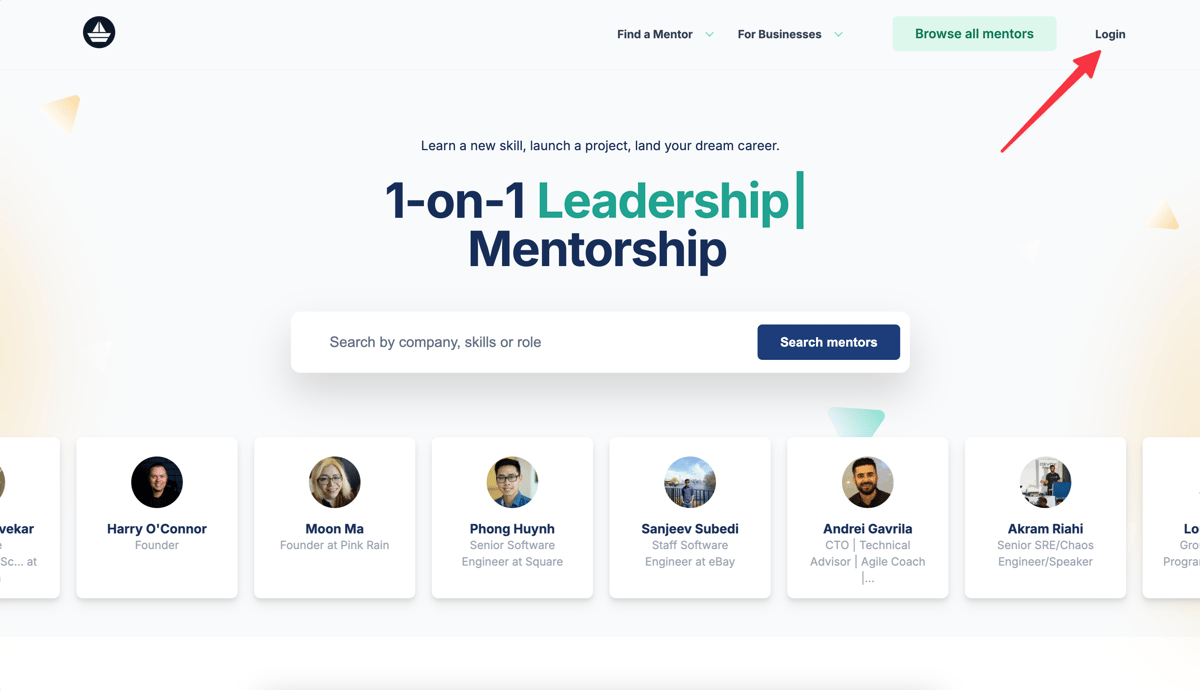
Matching With a Mentor
Next, you can start looking for mentors in your field through the mentoring platform’s search panel. Different software will vary in how you match with a mentor, but, generally speaking, you set certain filters and requirements, and you’re presented with options based on that.
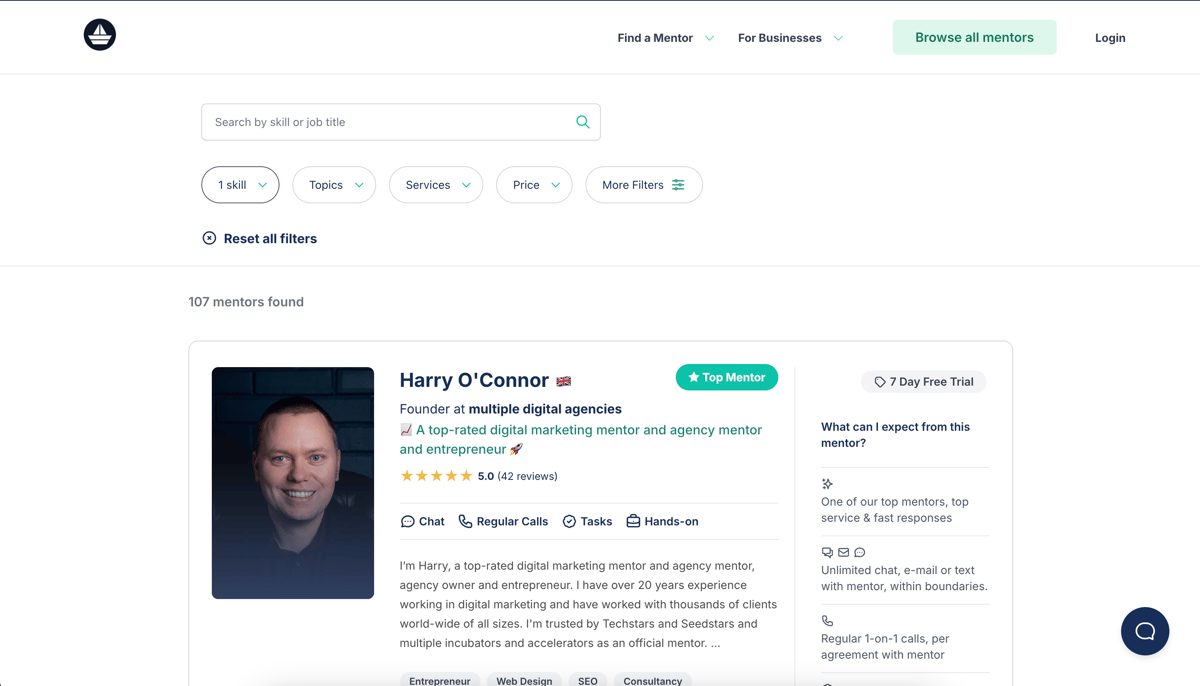
“Chemistry Call” for Introduction
Otherwise known as the “awkward meeting.” This is where you meet your new mentor over a video or phone call to just “vibe.” See if your personalities match and whether or not you have your eyes on similar things.
Setting Up Future Meetings and Expectations
You want to communicate all your needs, weaknesses, and expectations from the get-go to know what to expect. There should be somewhat of a blueprint planning session. How will you two meet? How will the mentee be held accountable? And whatnot.
Measure Improvement and Success
Remember to record successes (failures, too–the lessons) and measure your improvement with your new mentor.
Seven Best Online Mentoring Platforms
Below are our top online mentoring platforms.
MentorCruise
MentorCruise is a mentoring platform that connects mentees worldwide to industry professionals in the line of Leadership, Marketing, Sales, Entrepreneurship, Engineering, Data, Design, and Business–the 21st-century tech billionaire package.
If you’re looking for personal mentorship catered towards your own goals, budget, and preferences, MentorCruise is an excellent choice.
Key Features–Why MentorCruise is #1
Excellent collaborative tools like live chat, weekly to-dos to grow professionally and personally, practice activities (like coding challenges), video calls for clearer, seamless communication and bonding, and hands-on support.
Background info and stories on all mentors to get to know them deeper and understand where they’re coming from.
Human-Like AI Matching Assistant asks profiling questions in a friendly, conversational manner to make the onboarding process easy.
Widest range of available mentors in programming, design, and business. There are also administrative mentoring solutions designed for teams, startups, schools, and boot camps.
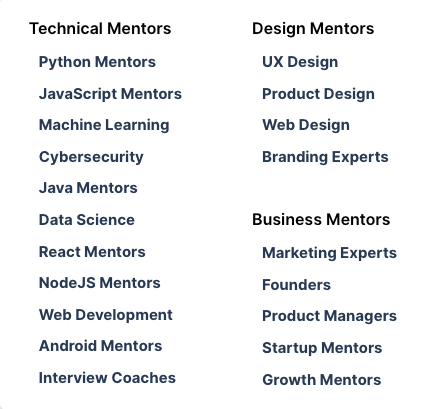
We especially like MentorCruise because of their easy seven specialized onboarding sessions catered to different needs at a knocked down price. They address pretty much any mentoring need and ensure that you feel welcome:
- Introductory Call–get a personal tour of MentorCruise and lessons on how things work around there.
- CV Feedback–need tips on optimizing your application? A hiring expert can help you with that over a 30-minute chat.
- Work Review–need to improve on a project but can’t put your finger on it? A mentor will sit down with you and give you valuable insight into taking your stuff to the next level.
- Study Plan–if you want to learn a new skill, you can book a consultation with an expert in the field to set up an action plan and learn pro tips on how to excel.
- Career Strategy–you can get the truth about where you can point your career next or how to keep going for progress with a mentor who’s been through it.
- Interview Preparation–nervous about an interview? You could kill it after a one-hour session with a technical interviewer mentor who can guide you to getting that job offer.
- Expert Consultation–a 60-minute call for any mentoring needs (if the other six-session types don’t fit the mold).
Pricing
The prices are dependent on the kind of mentor and their respective rates. You can start as low as $10/month and go higher than $500 on MentorCruise.
Pros
- Encourages and enables collaboration to foster the mentor-mentee relationship
- Wide range of mentors for many different areas
- Verified mentors are industry veterans from Fortune 500 companies
- Free 7-day trial with every mentor so you don’t waste money while finding the right match
- No strings attached–you’re not bound by any contractual requirements; cancel anytime you want
- Safe money-back guarantee in case you’re not satisfied.
Cons
- Since the mentors are big-time professionals at F500 companies, their rates tend to be higher and can be unaffordable to mentees just starting.
Career Karma
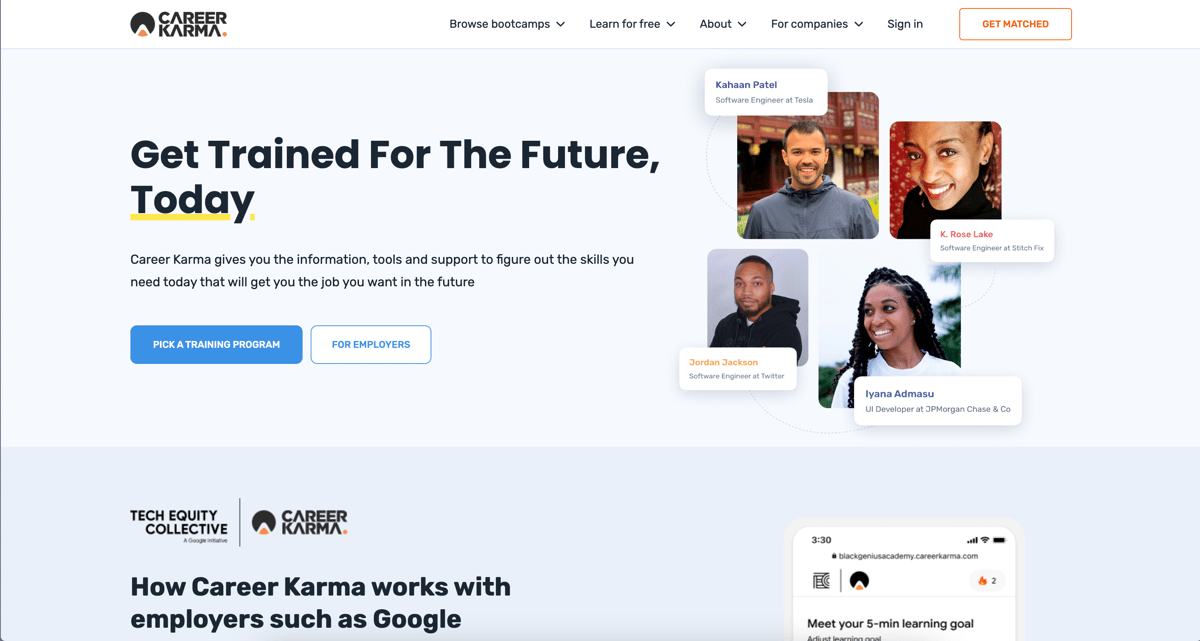
The co-founders Ruben Harris, Timur, and Artur Meyster, launched their app, Career Karma, as a build-off to their career advice and journeys podcast: Breaking Into Startups.
“Breaking into Startups actually helped hundreds of people get jobs on their own, but those were the most disciplined people. The people that didn’t have as much discipline required more help,”
~ Ruben in a Forbes Interview.
Career Karma started to help people become software engineers and other tech-related positions by matching them with the appropriate coding boot camps and providing consistent, long-term support.
If you haven’t guessed it already, this is a tech and programming-heavy mentoring platform. So, if you’re in that industry and looking to grow your career, Career Karma may be a viable niche option.
Key Features
Career Karma offers many exploratory options for its hundreds of boot camps.
The first one is a simple and fast-tracked training program matcher. Simply choose your desired tech position, software engineer, data scientist, designer, data analyst, or cybersecurity, and hit “GET SCHOOL MATCHES” to auto-match relevant training and mentoring programs.
The location-based program recommender registers your inputted location and provides real-life or a cloud-based mentoring solution so you can level up your skills in that region.
Third, you can explore the best boot camp programs based on student ratings. Fourth, you can explore popular courses by filtering through subjects and technologies.
You can get guidance by getting matched up with a mentor who recently enrolled in a tech boot camp.
Pricing
Currently, Career Karma’s revenue stream is based on an affiliate partnership structure. They charge 10% of a student’s tuition (student placed into the program by them, of course) to the boot camps. So as far as users are concerned, their only expense is paying for education.
Pros
- Since Career Karma offers “classroom-like” long-term courses, you can meet other people participating in the class during your job search to build lasting relationships.
- There are sub-groups and communities (like Reddit) like “Beginners” or “Ask a Coach” where you can explore and participate in discussions to absorb and contribute as much knowledge as possible.
- Career Karma has an app so you can access your mentorship activities and program health analytics anywhere, anytime. You’ll also be able to join live conversations between founders to gain insightful knowledge.
Cons
- No native chatting system that encourages communication between members.
- Training courses and mentoring are scheduled like a classroom: long-term and require strict commitment, unlike occasional/weekly live meetings with mentors for consultation.
Clarity.fm
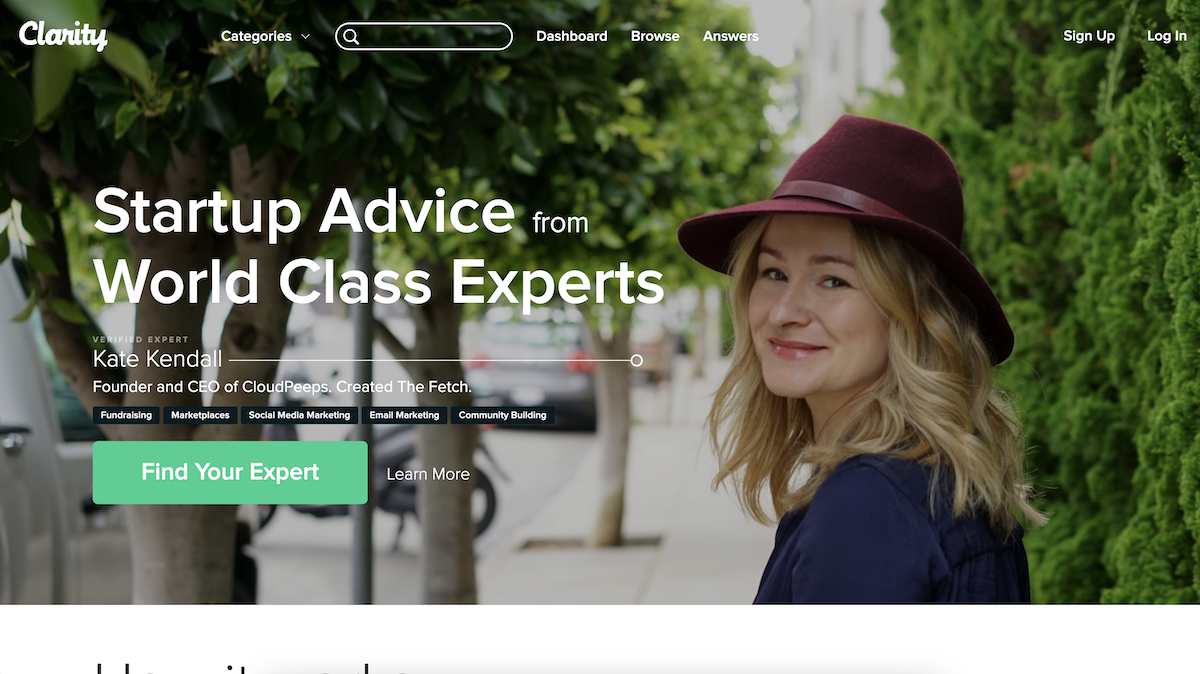
Clarity is a popular marketplace for one-on-one expert consulting. This mentoring platform gives you that opportunity for people who are willing to pay for valuable answers and advice. Anyone can become a mentor or mentee by signing up and verifying their socials. Mark Cuban is actually on the platform, but he charges $167 per minute. Do what you want with that information.
Key Features
Clarity’s call scheduler allows you to select the call duration, three dates, and times that work with your schedule and leave a brief “teaser” for the call. (The mentor has 72 hours to respond before the request expires)
The mentor browsing feature displays different goals and interests relevant to your needs. You can choose the mentoring sector. For example_,_ you’d find something like “How to grow a profitable eCommerce business under Business.” You’ll see the mentor and their rate per minute (e.g., $3.33/minute).
Pricing
The prices are on a per-minute basis and entirely depend on what the mentors choose to charge. On average, a 30-minute call will accrue $50 ($1.60/minute)–but, as mentioned earlier with the Mark Cuban example, rates could go higher than $100 per minute.
Pros
- The rating system gives users insight into what kind of a mentor they can expect.
- Mentor goals are clear-set, so the mentee knows precisely what to expect.
Cons
- Mentor services are pre-set. If you have personalized requests that you can’t find as a consultation service, then you’re out of luck on the platform. You can try to message a mentor with your unique needs, but they may not be qualified (resulting in ineffective mentoring programs), or they could reject your request.
- The wait time for mentor approval is three days–at which point, if they reject you, you’ve just wasted those three days.
- The mentor vetting process compared to other platforms, the mentor vetting process is not very credible. A mentor must build up reviews from mentees to gain trustworthiness on the forum. This leaves mentees wondering whether or not they should trust the mentor with no reviews.
- Enterprise mentoring isn’t possible since this is a one-on-one platform.
GrowthMentor
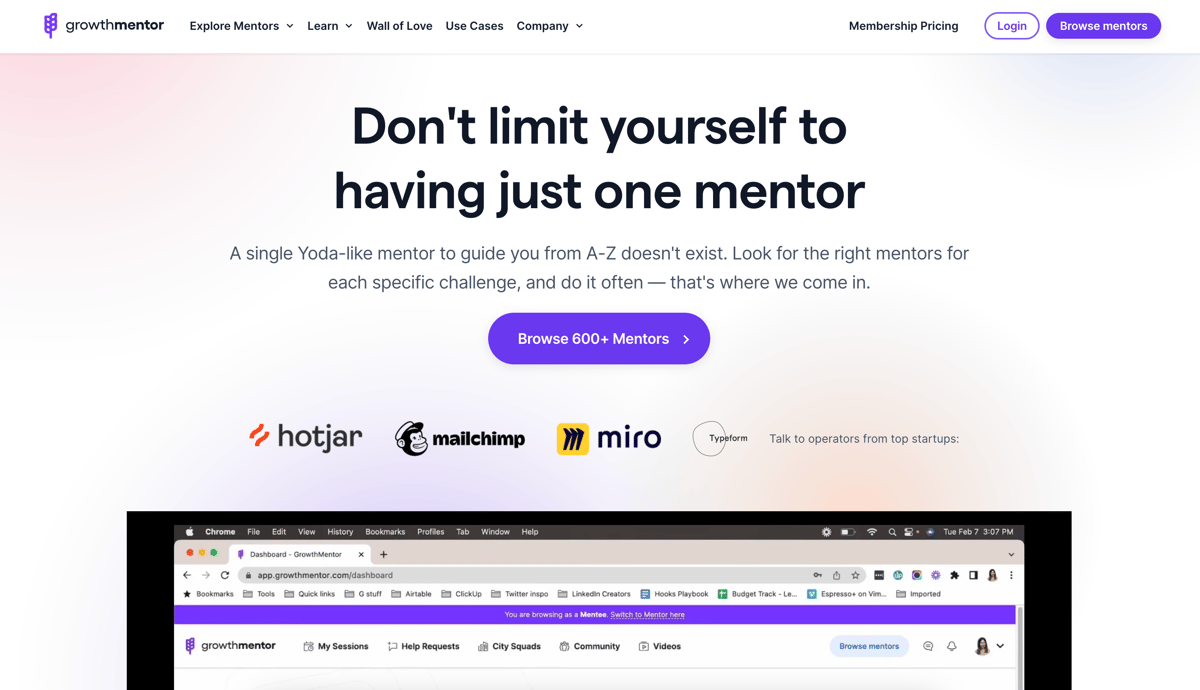
GrowthMentor is a trustworthy mentoring platform that hires start-up and marketing mentors on an invite-only basis by vetting their on-paper credentials and reviewing proven experience in their fields. GrowthMentor helps you stand on the shoulders of giants by getting advice from the peeps who’ve already played the game and are eager to help.
Key Features
You can get access to a big circle of mentors like serial entrepreneurs, marketers, and startups for a direct 1:1 guidance call by paying a monthly fee.
If a one-time, one-on-one counseling session isn’t enough, sign up for the monthly coaching sessions to foster long-term growth.
Schedule a call and choose a duration with the appointment booker with the built-in calendar. Intuitive and organized display of potential mentors that can apply to your specific succession planning.
Pricing
GrowthMentor’s pricing is different from other mentoring platforms in this article. Rather than paying mentors directly by the hour or minute, simply pay a singular fee periodically to GrowthMentor and let them handle the rest.
Currently, GrowthMentor’s membership plans include:
- $75/month ($225 paid quarterly)
- $50/month ($600 paid yearly)–save 33%
By paying that sum, you get:
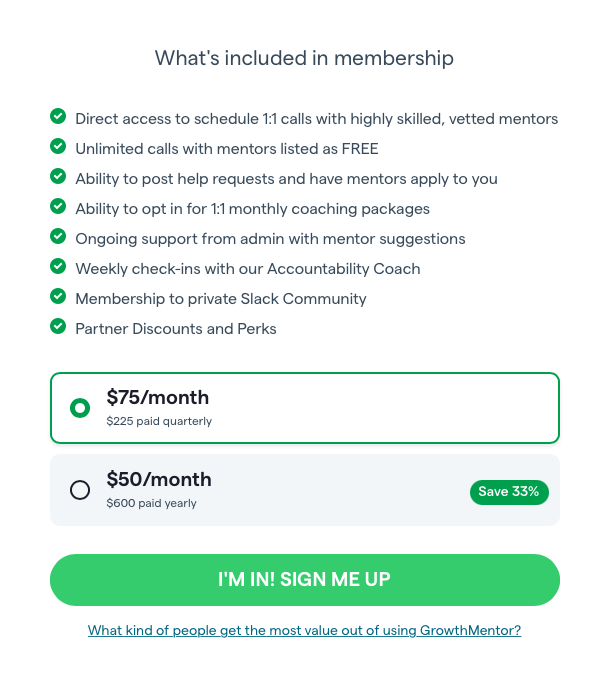
Pros
- All mentors on this platform are vetted thoroughly, interviewed, and accepted on an invite-only basis.
- Easy, straightforward payment system
Cons
- Though the payment system is straightforward, the upfront costs of, for example, $600 yearly or $225 quarterly may be too much to bear altogether for many newbies.
The Muse
The Muse is one of the more prominent platforms on this list, with over 50 million users. More than a mentoring platform, it’s an aggregation of resources relating to career growth advancement. They manage multiple programs: streamlining employer-job seeker channels, sharing career advice from seasoned professionals, and offering optional private coaching.
Key Features
As we said, the muse is more than just a mentoring software. They have actionable tools to help you advance your career, like a comprehensive job search tool with filters including industry, experience level, remote work, company size, and perks and benefits.
The Muse also has a comprehensive company-search tool to find the right work environment to grow and prosper under exemplary leadership and mentoring. You get an accurate feel for the company culture through informative articles, company office photos and videos, and employee testimonials. This is an excellent tool for those interested in applying to the company for opportunities other than just the position title itself.
The “ADVICE” panel in the header of their blog section is packed with career advice. You can read free information and advice from industry experts in the blog posts and implement them in your own life to start seeing changes.
Of course, the fourth (most recently added in 2016) mentoring outlet offers direct coaching. The muse allows mentees to choose a specific struggle and then suggests appropriate mentors to help guide them through their journey.
Pricing
Muse’s job board and articles are free. However, they make money from career coaching–prices depend on the mentoring service. So, for example, a 30-minute resume review typically accrues $119 for one round of edits. The programs/courses get more expensive for management, leadership development, and career growth.
Pros
- The Muse can run multiple programs. Not only do they provide career education and private coaching, but they excel in program management by coupling those resources with job and company research tools to ensure the mentoring process is streamlined.
Cons
- Muse’s content is relatively general. As a result, software engineers, product managers and designers, and data scientists may not find the content actionable.
- Their content is geared for people already working and looking for career advancement–rather than newbies dipping their toes in the water. The content may therefore be harder-to-understand and irrelevant for new hires.
- Many programs are pretty expensive for the average joe
MentorPass
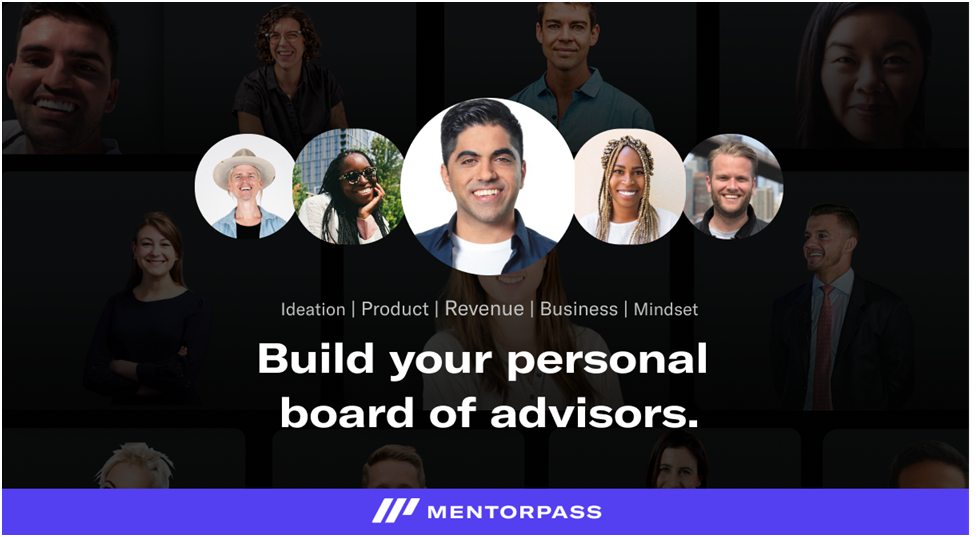
MentorPass is a mentoring platform for startups. It helps founders build and grow their businesses by connecting them with top startup advisors globally. Kenny Hanson, a former Accenture consultant, founded this mentorship platform. He identified the need to combine coaching and incubator benefits for people.
This mentor matching platform provides access to coaches and mentors in different areas. With MentorPass, you’ll learn how to raise money, service pricing, and resource scaling. You can also get access to funding through this online mentoring platform, as many investors use MentorPass to identify attractive investments.
Key Features
It focuses on connecting founders with direct-to-consumer (DTC) startup mentors to help their business scale effectively.
With a monthly subscription, members get a coach for one-on-one sessions and can access the expert network.
It helps overcome challenges in different fields like sales, product management, engineering, fundraising, branding, etc.
Pricing
This mentorship platform subscription is quite different from many others; it is divided into solopreneur, startup, and scale. Also, this mentor platform doesn’t require you to pay by the hour or minute.
Instead, your subscription gives you several credits that you can use to book calls with mentors on the platform. The higher your credits on this coaching and mentoring platform, the more sessions you have with higher-tiered mentors. Below is a breakdown of these mentoring platforms:
- Solopreneur: $300/ month (30 credits)
- Startup: $600/month (60 credits)
- Scale: $1,200/month (120 credits)
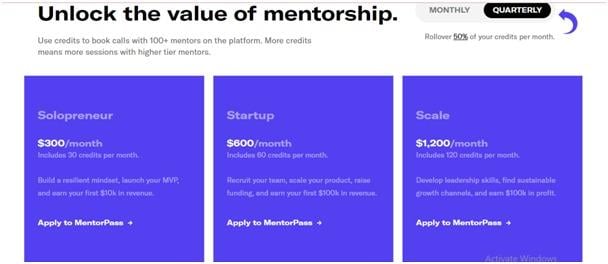
Pros
- It combines coaching and access to an expert network
- It minimizes the time and cost of decamping to an incubator
- Mentors on this online mentoring platform are thoroughly vetted and interviewed to only provide you with the best
Cons
- MentorPass’ monthly subscription might be too high to keep up with for most founders
MicroMentor
MicroMentor is a non-profit online mentoring software platform geared for corporate mentoring programs, small business development organizations, economic development agencies, and entrepreneurial foundations.
MicroMentor allows flexible administrative control through personalized project management, consulting, and resource support for a successful mentoring solution. Clients like HP, Calvert Foundation, and the U.S. state department use MicroMentor as a unique employee engagement tool.
Key Features
MicroMentor features an intuitive chat messaging system so mentors and organizations can efficiently communicate tips, goals, and keep mentors accountable with their objectives.
Since MicroMentor caters to organizations and teams, they offer customizable branding solutions to personalize the mentoring platform and experience.
MicroMentor’s automated notification system sends mentees and mentors important alerts or email invitations to ensure participants stay on top of activities and be held accountable.
This mentoring system also has guidance and monitoring capabilities with engagement tracking, reporting, and statistics.
Pricing
$0. MicroMentor is a non-profit, so the mentoring services are free, thanks to government and private funding and donations.
Pros
- Free-to-use non-profit
- An international platform that helps underserved businesses around the world
- Entrepreneurs and mentors can reach out to you instead of you finding them
Cons
- Because the mentoring services are a non-profit reliant on donations and funding, growth resources may not be as extensive as some of the paid mentoring platforms on this list.
- Volunteer mentors are dispersed, so you can’t have as much time with them as you like.
Together

Together is a platform founded by Nathan Goldstein and Matthew Reeves in 2018. This mentoring program connects you with many experienced mentors in your preferred field of expertise. Together uses mentor matching software to connect you with the ideal mentor for you. It targets companies with over 500 employees and helps development teams run a mentoring program for employees.
It works by allowing employees to fill out a questionnaire that captures their development area and goals. Then, the mentoring software uses a pairing algorithm that matches the employee with a relevant mentor within the company.
Key Features
It includes reporting features that make it easy for organizations to track the progress of mentoring relationships.
Employees don’t have to utilize a new mentoring software because this mentoring platform integrates with their existing calendar system and emails.
It supports the different types of mentoring and provides various handbooks and courses to facilitate a smooth mentoring process.
Pricing
With Together, you’re paying for results and not for the software. Therefore, there are four pricing tiers for active users. They include:
- Free: $0/month
- Starter: $6/month
- Professional: $5,000/month
- Enterprise: $10,000/month
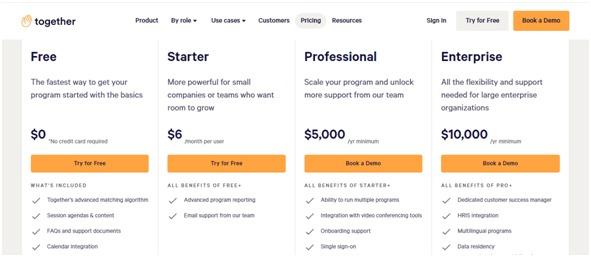
The starter plan caters to companies with less than 500 employees and gives users access to advanced program reporting and email support from the team. The professional and enterprise pricing tier is for companies with over 500 employees, making it ideal for organization-wide programs.
Pros
- Together offers an intuitive interface that’s easy to use and caters to different company sizes.
- There’s exceptional customer support, and you can hold Q&A sessions with program administrators before rolling out programs.
- It provides companies with reports that allow them to have a bird-eye view of their mentoring programs. Companies can measure mentoring activities to determine who meets the goal and who isn’t.
Cons
- Although the process of pairing mentees with mentors is automated, organizations have to manually review the rules of the pairing process.
Fly High Under the Wings of Experts
After reading this ultimate guide on the six best mentoring software and platforms, you should know by heart the criteria it takes to transform ineffective mentoring programs into great ones. That means you know the mentoring programs to look out for.
We think MentorCruise has the best mentoring culture, with versatile mentors who can go from talking on a scalable SaaS solution to monitoring check-ins for their mentees and continue to support top organizations in any way possible.







